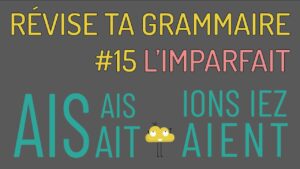Imparfait in French
The Imparfait, the Passé Composé and the Passé Simple walk into a bar...
- I'm finally taking off in my French lessons! I'm actually learning French now!
- Haven't you been studying French for weeks?
- Yeah, but now I'm starting to learn more verb tenses! So far it was just the present tense. Bonjour, je suis... Or Où est...? Je veux, je vais... Present, present, present! Today I started learning about the French past tense, a.k.a. the key to storytelling! History! Reading books! Watching Godard films! Bye-bye textbooks! Bonjour, immersion!
- Tenses.
- ...What?
- Past tenses.
- Oh no...
- Which one did you start with?
- Uh... The imparfait? Wait, is that why you guys don't just call it "le passé"? There's more than one past tense?
- We and every other language, including English. Anyway, what did you learn about it?
- The basics. That imparfait French is easy French! And it's a very easy-to-spot verb tense, too. You just need to learn one small set of verb endings that you put... well, at the end of verbs. For instance... ais, ait... J'étais... Tu étais... Tu avais... Je prenais... Tu prenais... Il prenait... Also, the imparfait is very useful in everyday life, whether you're writing or speaking. And one cool thing I learned is, even irregular verbs become regular in the imparfait tense!
- Your optimism about the French past tenses is heartbreaking.

Insert the exact words said from 0:09 to 0:15
- Let me try to use it, this is so exciting! Hmm... Okay, imagine that phone is ringing right now. In the present tense, I should say: "Le téléphone sonne." Right? Right?! So, if I want to say that yesterday the phone rang, I just say "Le téléphone sonnait". See? Easy! And check that vocabulary of mine! Not too shabby, eh?
- Perfect!
- Thank you!
- No, I mean, you should use a perfect tense here, like the passé composé : "Hier, le téléphone a sonné".
- What?! Why?!
- Unless you didn't answer the phone? Or you did, and you were about to mention it? In that case, I guess you can use the imparfait and say "Le téléphone sonnait". Of course, in a novel, or in short stories like fairy tales and novellas, you'd probably find the passé simple in most cases: "Le téléphone sonna". But that's another story.
- Oh, for the love of... Juliette Binoche.
- Du calme. Sit down and let's talk it over. Dinner? I made ratatouille.
- Ew!! Isn't that a rat?! And why did you underline those words?!
- Oh, mon dieu. Come. And stop breaking the fourth wall.
FAQ: What is the imparfait tense in French?
The imparfait is one of the French language's past tenses. It's an easy-to-learn, very regular tense. Along with the passé composé, it's used to describe events that took place in the past.
Tenses are trees, and they hide a forest
- I was getting ready to set the table. You have come to the right place.
- Why are you smiling? And seriously, what's with the underlines?
- I just used three past tenses in English.
- You did?
- Yup! I made... I was getting... You have come. All of these describe past events. You're about to find out that French almost mirrors English in that respect, so things are easier than what I made them sound like.
- Back to the imparfait, I beg you.
- Right. You do realize that imparfait means "imperfect"?
- Makes sense. It would also be a great name for a perfume.
- I'm going to give you the short explanation first: my French imperfect tense is your English past progressive tense. The imperfect describes an ongoing action, an event not yet bound, closed, finished in time. A "not perfected" action, so to speak.
- Je marchais dans la rue. (I was walking in the street.)
- Je regardais la télé le soir. ( I was watching TV in the evening.)
- But if it's in the past... Doesn't that imply that it's finished?
- Yes it does. Kinda. But in storytelling terms (which is what languages are all about), you can look back at those events and relive them from a bunch of perspectives. In textbooks and classrooms, all you'll hear about are tenses. But you'll never hear about aspects. Even French students who learn French don't hear about them unless they're in college.
- Aspects?
- Yep. That's what we linguists call perspectives. It's the way you choose to relive or talk about an event, whether it's in the past, present, or future. And French conjugations are notoriously based on aspect, not tense. So, if you don't understand aspects, you can't fully understand French verbs. In a lot of languages anyway, each tense can be expressed in combination with several aspects, and vice versa. That's a heck of a multiplicative factor!
- Uh oh...
- I know. Let's pick the word "perspective" instead of "aspect", as "aspect" has its own meaning in everyday life. Anyway, I'm sorry to go all academic on you, but we do need to look at some verb forms. Glass of wine before we start?
- Yes, please.
- Red or white?
- Full.
FAQ: What is the difference between perfect and imperfect tense in French?
The difference between perfect and imperfect is key to understanding French conjugation. For example, to talk about the past, the imparfait is an imperfect tense and the passé composé is a perfect tense.
Breaking down the imperfect tense
- Let's take a random, easy, regular verb like parler. Check out the following endings: these are "the small set of verb endings" you were talking about:
| Present Tense | Radical (eg. parler) | Terminasions (eg. parler) |
|---|---|---|
| je | parl- | -ais |
| tu | parl- | -ais |
| il, elle, ou on | parl- | -ait |
| nous | parl- | -ions |
| vous | parl- | -iez |
| ils ou elles | parl- | -aient |
- Voilà, that's what I learned in class today. Finally! Come on, that's the French imperfect right? Right? How much more am I supposed to learn about it?!
- Not much. Another thing you got right, is that it's always regular, to the point that it "straightens" irregular verb forms into regular forms. Like, venir (to come) is super irregular in French. Compare the present tense that you've learned so far with the imperfect tense. The irregular parts of the present tense appear in bold:
| Present Tense | Radical (eg. venir) | Terminasions (eg. venir) |
|---|---|---|
| je | vien- | -s |
| tu | vien- | -s |
| il, elle, ou on | vien- | -t |
| nous | ven- | -ons |
| vous | ven- | -ez |
| ils ou elles | vienn- | -ent |
| Imparfait Tense | Radical (eg. venir) | Terminasions (eg. venir) |
|---|---|---|
| je | ven- | -ais |
| tu | ven- | -ais |
| il, elle, ou on | ven- | -ait |
| nous | ven- | -ions |
| vous | ven- | -iez |
| ils ou elles | ven- | -aient |
- Let me sum it up: the endings never change, and the radical is always the radical of the verb you find in the dictionary? Like in venir, I just stick the imperfect endings onto ven-?
- Yep, and that's not the only verb. That technique works 99% of the time, even with "tool verbs" like the auxiliaries avoir or aller. But, if you want to make it 100%, there's a trick: you take the radical of the present tense nous form.
- That's random. Not the vous forms, not je, or tu, just nous?
- I know. But it comes in handy with some nasty verbs ending in -eindre, or -oir. Check out the following verbs to see what I mean: peindre, atteindre, croire, voir... Mind you, the only notable exception to the nous rule is the verb être "to be'" The present tense nous form is sommes, and it won't be of any use to you. The radical of être in the imparfait is ét-:
- J'étais, tu étais, il elle était, nous étions, vous étiez, ils elles étaient.
- Okay, so the imperfect tense is easy to form, if I may say. Now how do I use it?
FAQ: How do you conjugate the imparfait in French?
The imparfait in French is a simple tense, with a regular set of endings. As for the verb base, it is always the nous form of the verb in the present, whether the verb is regular or irregular.
The verb endings for the imparfait are -ais, -ais, -ait, -ions, -iez, -aient.
Hopping on the Imperfect Train
- Its main or general use is that you really want to talk about a past event as being stretched in time, as ongoing. Either because you're talking about states of being, habitual actions, or just actions that took some time to perform. In short, with the imperfect tense, you're bringing back the people you're speaking with to that moment in the past where you "were doing" something:
- Quand j'étais jeune, je mangeais beaucoup. (When I was young, I was eating / I ate a lot.)
- Tous les jours, il pleuvait. (It was raining / rained everyday.)

Insert the exact words said from 1:16 to 1:21
- Wait, about those translations you gave... "Was eating" and "was raising" are the English past progressive, and "ate" and "rained" are the... English simple past tense?
- Bravo! You're good at English grammar!
- Merci. So the French imperfect tense matches with both of those English tenses?
- We linguists say that they overlap. Every time you use the English past progressive, I use the imperfect tense in French. When you use the English simple past tense... well, sometimes I'll pick the imperfect tense, but not always.
- Oh. Mmmm... Mmm...
- Is my ratatouille that good?
- No. I mean yes, that's one tasty rat. But I just thought of something. When we learned the French present tense, we learned how to use être en train de so that we could match it with the English present progressive. Like:
- Je mange de la ratatouille.
- Je suis en train de manger de la ratatouille.
- That is an excellent point! Let me provide English translations for these two sentences, and you might have an epiphany:
- Je mange de la ratatouille. (I eat / am eating ratatouille.)
- Je suis en train de manger de la ratatouille. (I am eating ratatouille.)
- No epiphany so far...
- Wait for it.
- Oh wait! Is être en train de kinda... "forcing" the progressive perspective?
- There it is!
- So, the French present tense does what the French imparfait does: it overlaps two English tenses! The simple present and the present progressive! Être en train de is just there to make sure we position from a progressive perspective! So if I switch back to the imparfait, we get:
- Je mangeais de la ratatouille (I ate / was eating ratatouille.)
- Oui, and if you want to make sure you position from a progressive perspective, which is already supposed to be the case with the imparfait, you say...
- J'étais en train de manger de la ratatouille! (I was eating ratatouille!)
- Oh, sweet epiphany!

Insert the exact words said from 0:41 to 0:45
FAQ: What is the imparfait used for?
The imparfait in French describes past events as ongoing, stretched in time, or habitual. For that reason, it overlaps the past progressive and part of the simple past in English.
The Imparfait vs. Passé Composé bump
- Now, remember when I said languages are made for storytelling? That brings us to the second use you might have for the imparfait. Most of the time, something happened in your story. Something that made you stop in your tracks, or something that was a significant obstacle in your routine. Like, you were doing something, when this thing happened or someone showed up:
- Je parlais à ma mère, quand le téléphone a sonné. (I was speaking to my mother, when the phone rang.)
- Il faisait des courses, quand il a commencé à pleuvoir. (I was running errands, when it started raining.)
- Je travaillais à Paris quand j'ai rencontré mon petit-ami. (I was working in Paris when I met my boyfriend.)
- Hey, is it me, or do the French imparfait and the English past progressive match perfectly in these sentences?
- Tout à fait! It's because of the contrast with the passé composé.
- Oh boy... The passé composé sounds annoying...
- Not at all. It actually looks like the present perfect in English, and can be used in the same contexts: you use avoir in the present tense, and you add the past participle form of your verb.
- I think I'll save that for later.
- Did you leave some room for dessert?
- As long as it isn't parfait...
- Aha! It's cherry clafoutis.
FAQ: Is it possible to have both the imparfait and the passé composé in the same sentence?
Yes it is. The imparfait may describe an action or state as ongoing, until it got interrupted. The passé composé may be used to describe the interrupting event or action.
The Passé Simple is another story
- I'm stuffed.
- Yeah. I went a little overboard with dinner.
- Well, at least we're done now.
- The passé simple...
- You never know when to end it, do you?
- You only use it in writing, and mostly in literary writing as you can see in French Short Stories. But now that we had this long conversation over dinner, I can give you a super-short, linguistic explanation: you use it as the English simple past tense. Its perspective on past events is what we linguists call "punctual": it describes events as dots on a timeline, as super short events that you can string in rapid succession like pearls on a necklace. That's probably why it remained pretty much alive in written French. In spoken French though, it has been replaced by the passé composé.
- That felt oddly easy to understand.
- Everything is easier over wine and ratatouille, mon ami!
- Oh God, I can't believe I actually tried rat and ended up enjoying it. Can you give me the recipe?
- It... isn't... rat!
FAQ: What is the difference between the passé simple and the imparfait?
The French passé simple is a literary equivalent of the passé composé: it describes past events as dots on a timeline, while the imparfait describes past states and ongoing or habitual actions.





